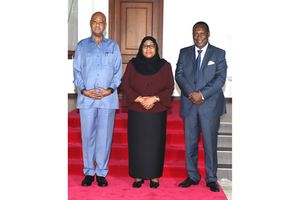
Tanzania’s political landscape and democratic space in 2024 have been influenced by President Samia Suluhu Hassan’s ‘4Rs’ philosophy.
Dar es Salaam. The political landscape of Tanzania in 2024 has been undeniably influenced by President Samia Suluhu Hassan’s ‘4Rs’ philosophy—Reconciliation, Reforms, Rebuilding and Resilience.
Political analysts, however, offer a spectrum of perspectives on the tangible impact of these principles.
Some herald the 4Rs as vital to restoring political freedoms and fostering unity, while others point to gaps in implementation, suggesting that governmental actions, at times, undermine the very pillars that President Samia set out to establish.
At the heart of the 4Rs was the idea of healing deep political divides, particularly after the repressive era of former President John Magufuli.
The notion of reconciliation was viewed as pivotal for opening up political space, which had been stifled under Magufuli’s government.
This was especially notable in the early months of 2024 when opposition parties were allowed to hold public rallies—a major shift from the harsh restrictions placed on such gatherings during the previous administration.
A political analyst at the University of Dar es Salaam, Dr Richard Mbunda, observed that the lifting of the rally ban was seen as a commendable move toward political inclusivity.
“Allowing political rallies is one of the most significant steps toward reconciliation. It gives opposition parties the space to voice their opinions and engage with the electorate,” he shared.
However, Dr Mbunda also cautioned that the government’s commitment to full reconciliation has been tested.
“Though rallies were allowed, they were not free from limitations. When opposition protests turned into calls for justice in response to political violence, these protests were often suppressed,” he remarked, highlighting the tension between the government’s desire to open political space and its actions that seemed contradictory.
The tragic case of Ali Kibao, a member of the Chadema party who was abducted and killed in 2024, further deepened these concerns.
“Reconciliation cannot be achieved merely through permitting rallies. True reconciliation requires ensuring the safety and freedom of expression for all political actors. Without addressing violence and harassment, the process risks being superficial,” explained Dr Faraja Kristomus, also from the University of Dar es Salaam.
Reforms, another pillar of the 4Rs, were intended to usher in a new era of governance marked by transparency and accountability.
President Samia made strides in promoting national dialogue, and efforts to combat corruption were seen as necessary actions for rejuvenating Tanzanian politics.
However, analysts remain cautious, pointing out that some reforms, particularly in the electoral process, have been met with resistance.
A political scientist at the University of Dar es Salaam, Dr Paul Loisulie, highlighted that while some reforms had yielded positive results, the influence of the President’s Office—Regional Administration and Local Government (PO-RALG) on local government elections raised concerns.
“The government has made efforts to improve transparency, but the continued control over local elections by President’s Office—Regional Administration and Local Government casts doubt on the authenticity of these reforms,” Dr Loisulie said.
According to them, the rebuilding phase of the 4Rs has been particularly challenging, as Tanzania’s political environment remains polarised. National dialogue initiatives and joint committees between government and opposition leaders were hailed as progress.
“These dialogues show that both sides are willing to come together and address national issues,” said a political analyst at the State University of Zanzibar (SUZA), Prof Makame Ali Ussi.
However, the deepening division, especially between the ruling party and the opposition, has stymied efforts to build genuine unity.
“While discussions have taken place, the lack of tangible progress on human rights violations and political violence has made it difficult for any meaningful reconciliation to take root,” added Prof Ussi.
Another UDSM political analyst, Dr Onesmo Kyauke, underscored that real rebuilding requires the restoration of trust between the government and opposition.
“National unity cannot be restored while the opposition feels silenced and targeted. Without addressing these issues head-on, rebuilding remains a distant hope,” Kyauke explained.
The final element of the 4Rs, resilience, is arguably the most significant, as it determines the ability of Tanzania’s political system to weather challenges without succumbing to authoritarianism or political violence.
While Samia’s administration sought to strengthen political resilience, the handling of opposition protests throughout 2024 raised serious questions about the government’s commitment to peaceful coexistence and political stability.
A political analyst from the Open University of Tanzania, Dr Revocatus Kabobe, criticised the government’s use of force to curb opposition protests.
“Resilience should be about facing challenges with a calm and steadfast commitment to democracy. The violent repression of protests, particularly those seeking justice for opposition members, shows that resilience is still far from being fully realised,” Kabobe argued.
In light of these tensions, Dr Kabobe suggests that as the country moves toward the 2025 elections, the political climate remains fragile.
“The government’s ability to maintain political stability will be tested by the growing frustration among the opposition, particularly in response to the increasing use of force against protesters. The resilience of Tanzania’s democracy will depend on whether the government can allow space for political dissent and maintain a fair electoral process,” he said.


